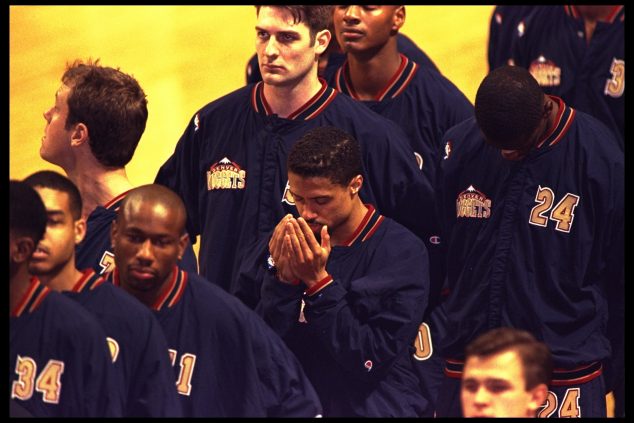I started this column over 10 years ago with a notion that the SLAM Magazine audience would be down to read a regular feature on the never-ending collisions between politics and hoops. It was a longshot proposal, one made by a no-name writer in an apolitical sports landscape. But the people at SLAM believed in attempting it, and I’ll never be able to fully repay the Editor-in-Chief at the time, Ryan Jones for the opportunity, Ben Osborne for getting behind it, Susan Price for the ongoing support and former SLAM editor Scoop Jackson, whose writing first inspired me to read SLAM and cold-call the magazine.
When Ryan Jones said we should give it a try, it was a life-changer for me. I had been experimenting with sports and politics writing in the early days of internet blogging, when my readers were family and whoever those in my family happened to be dating. SLAM gave me credibility and an audience. With magazine pages at a premium, they took a real risk at repelling sponsors, NBA owners and, at times, the players themselves.
We covered stories in this space long before it was of the fashion that you see today: NCAA exploitation, the hypocrisy of high school stars being banned from entering the NBA draft and the emerging verbal and even physical conflicts arising between NBA players and the police. If the police incidents that players of the stature of Chris Webber, Dale Davis and Gilbert Arenas had to endure took place today, Twitter would explode with hashtags and trending topics. We also highlighted the few who were willing to be outspoken, like Etan Thomas, Adonal Foyle and Steve Nash, as well as the hidden histories of proudly political players who paid a price, like Craig Hodges and Mahmoud Abdul-Rauf. We examined how then-NBA Commissioner David Stern was alienating a new generation of players—from his dress codes to monitoring where players went on the road to a disastrous short-lived effort to use a new kind of basketball. This tension widened with each passing year, until the 2011 lockout; Louder Than a Bomb readers were unsurprised when it all came to a head.

There are now a whole generation of sports journalists—not to mention ESPN-branded websites—who cover the combustible politics of sports. These journalists are more diverse, more open about what they think and like the players themselves, more rebellious against the way things have always been. I like to think that this space—and SLAM Magazine in general—helped lay the groundwork for that. I’m also grateful for every NBA and WNBA player who openly, proudly and—most important—loudly let fans around the world know that they are more than vessels of entertainment, but political actors who, if they are good enough to cheer, are good enough to hear. When NBA players over these last several years have chosen to speak out for Black Lives Matter or stand up to this amoral president or wear shirts that say “I Can’t Breathe,” they are shaping the political conversation and giving lie to the idea that being “political” is somehow a dirty word, instead of a methodology of liberation. James Baldwin once said that “America is a country devoted to the death of the paradox,” meaning that people are always trying to put you in a box and tell you that who you are is all you will ever be. When athletes speak out, they are breaching the box and allowing us to be the paradoxes that we all are. They are helping all of us.
I will miss writing Louder Than a Bomb. I will miss meeting all the SLAM readers who come up to me like we’re fam. Most of all, I will miss having a small piece of journalistic real estate in the only basketball magazine that’s ever really mattered.
In struggle and sports, Dave Z.
—
Photo via Getty Images